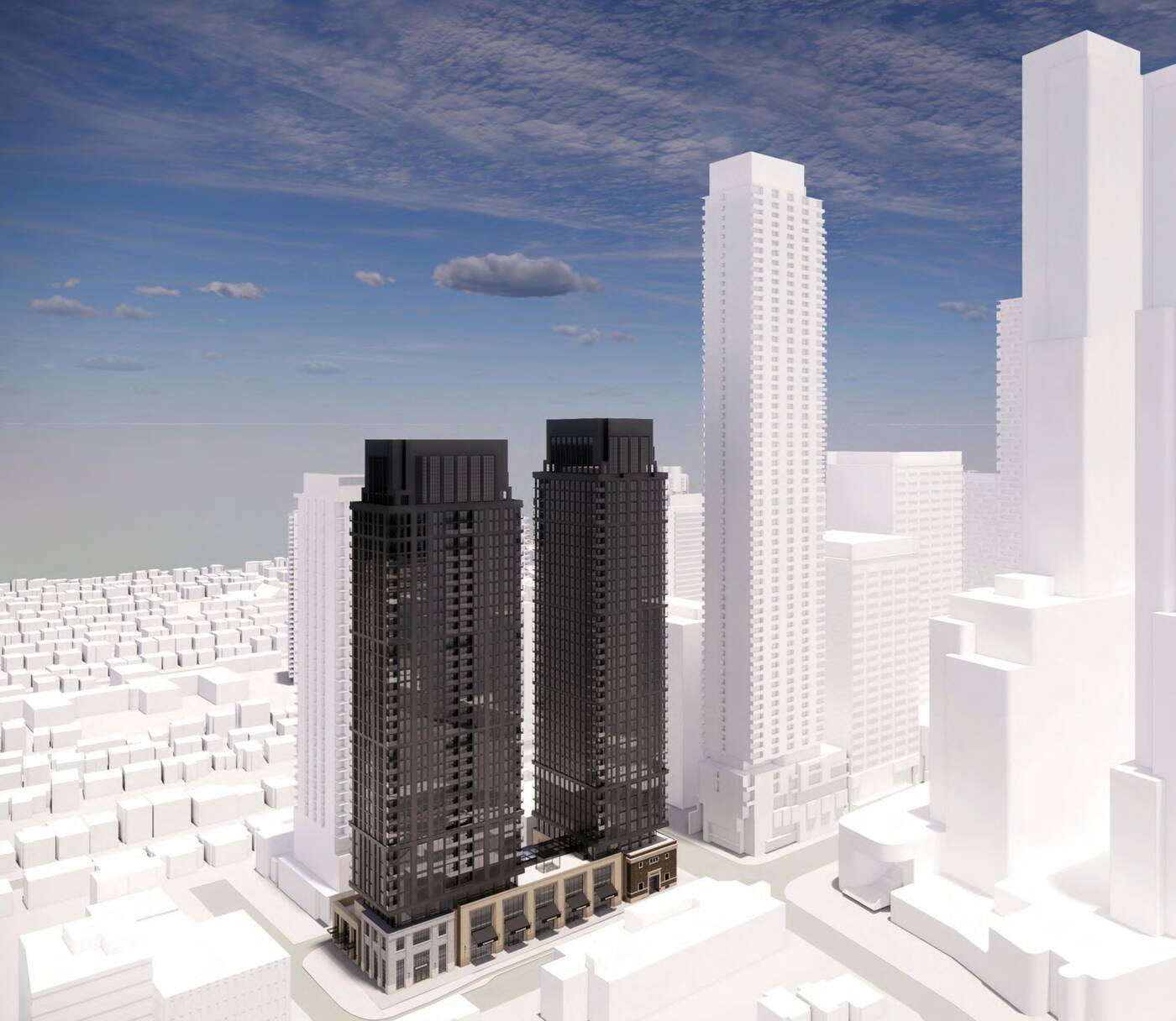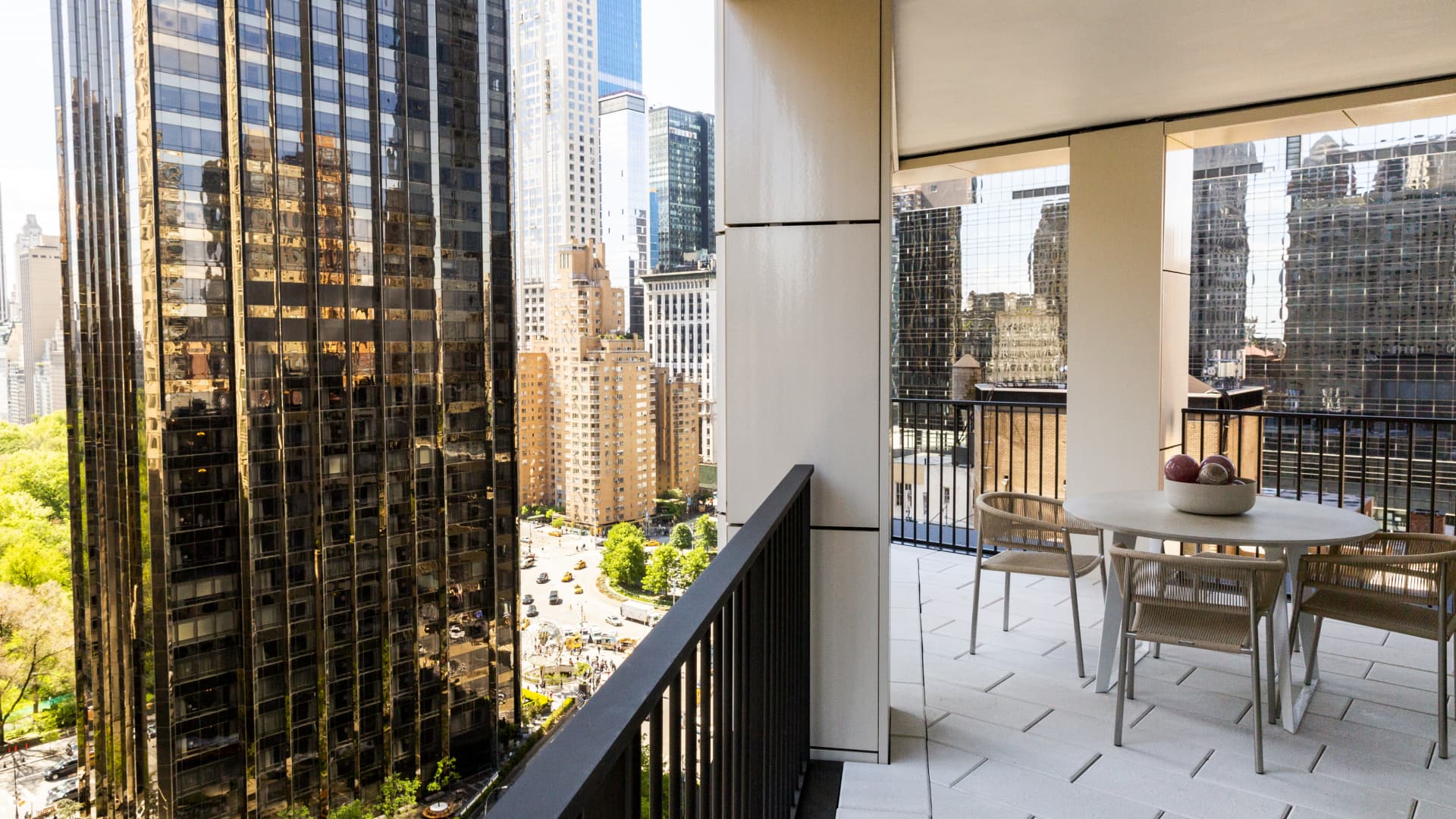Real eState
Buying your first home? What you need to know about navigating this real estate market – Knoxville News Sentinel
Jaxx Fox has lived in East Tennessee her entire life, although she never felt at home inside the apartments she rented. That’s why, three years ago, Fox decided to buckle down to save for her own home.
First-time homebuyers like Fox are entering a real estate market with drastically declining housing affordability, according to the National Association of Realtors (NAR).
The organization’s Housing Affordability Index indicates the short supply of homes is increasing costs across the country, and especially impacts first-time buyers.
Median family incomes in April fell 1.0% from March. Meanwhile, the monthly mortgage payment increased 16.1%.
Fox spent three years paying her student loans and saving so she could buy the home she always wanted. When she started searching, it wasn’t like anything she expected.
Fox found a place within a month, but that doesn’t mean it was easy.
From financing to finding a place, this is what first-time homebuyers need to know about a competitive and expensive real estate market.
How to prepare to pay for a house
The first step for new buyers is to figure out how to pay for a place. Usually, people buying their first property turn to mortgage lenders for a home loan.
Claudia Rios, senior loan officer with First Community Mortgage and founding member of the National Association of Hispanic Real Estate Professionals, has helped many first-time homebuyers since starting her career in financial services in 2006. She said the current real estate market is drastically different than anything she’s seen before.
Knoxville’s housing market: Home buyers are flocking to Knoxville. How one handled market.
Housing budget in 2021 market: Should you break your budget to buy? Knoxville agents give advice
Here’s how Rios suggests new buyers prepare to purchase their first place.
- Plan months in advance: Rios told Knox News new buyers should talk with a lender about six months before they hope to buy. “It’s never too early to start getting ready for a mortgage,” she said. Once first-timers find a lender, Rios advises following up often until they’re ready to start searching for a home.
- Check that your credit score is correct: The COVID-19 pandemic has created challenges for credit bureaus. Rios said she’s discovering that many scores are incorrect. If a buyer’s score is reported wrong, they can work with a lender to dispute the issue.
- Connect with a credit counselor if needed: Not everyone’s credit score is in the best position to buy a home. Rios tells her clients to aim to have a credit score of 700 or higher to get a good interest rate and to pay down debt. If you’re having trouble increasing your score, credit counselors are available to assist.
- Make a budget: Buying a home is a big investment, but you don’t want to get stuck paying more than you can afford. Rios asks her clients how much they’re comfortable paying monthly and works backwards. The goal is to make enough room in your income for a mortgage payment. Rios said setting aside 45% of income for a mortgage and 55% toward other expenses works well for most of her clients.
The most important thing to do before buying is to set realistic expectations. This starts with financing. Home costs are rising quicker than ever, meaning money doesn’t go as far.
According to an analysis by Hancen Sale, governmental affairs and policy director for the Knoxville Area Association of Realtors (KAAR), the median sales price of a home was $275,000 in June — up 21.4% from June 2020.
The 30-year fixed mortgage rate was 3.11% in April compared to 3.37% one year ago.
“Nowadays, the market is tight because a $250,000 loan doesn’t get you the nice four-bedroom house you might expect. Buyers have to go higher and be strategic,” Rios said. “It’s a disadvantage for a lot of people, new and previous buyers included, but that’s the reality.”
Rehab your home: Local agent launches program to help owners rehab homes before selling
How to buy your first home
For Fox, finding and buying her first home was the hardest part. It’s often the reason why many new buyers give up, especially in this competitive market. But realtor Nikita Hudson of Hudson Legacy Group said there are ways for buyers to withstand the pressure.
“My first conversation with a new buyer is just giving them a clear picture of what the market looks like right now and what the process is going to be like,” Hudson said. “It’s been tough because it’s not what they think it is.”
Here are Hudson’s tips to help set first-time buyers up for success.
- Research the real estate market: Just like it takes time to secure financing, new buyers should watch the market months before buying. Doing so allows first-timers to get a good idea of costs, timing and supply.
- Look below your budget: Hudson recommends buyers avoid homes at the top of their budgets. Look at listings that leave you $20,000 of wiggle room, she said. KAAR’s calculations show more than 68% of homes sold in Knoxville in May went for list price or above; nearly 10% sold for $25,000 or more over asking price.
- Be prepared to pay: Fox said a big down payment, paying for closing costs and offering earnest money helped her secure her home. Hudson seconds these strategies and advises buyers to include contingencies in their contracts. An example clause would be to agree to only ask for improvements over a certain cost.
- Get creative: Money talks, but Hudson said she’s seeing more buyers come up with creative solutions. “I’ve even had agents write up offers where they offer to have a champagne brunch at closing,” Hudson said. “You never know what’s going to sway a seller.”
- Always ask for an inspection: Jim Clabo, owner of A-Pro Home Inspection Services, said even amid market mania, it’s never a good idea to skip inspection. “Inspection can save you hundreds of thousands of dollars. At the very least, it gives buyers peace of mind.” Clabo advised new buyers to expect inspections to take a week because of delays.
- What’s meant to be will be: Hudson said she encourages her clients to have patience on their homebuying journeys. “Lord knows we all need it right now,” Hudson said.
From one first-timer to another
Fox’s homebuying experience ended quickly, and she counts herself among the lucky ones. She worked for years to achieve her money goals, which helped her prepare to purchase a place. What really made the difference was timing.
The North Knoxville house Fox bought appeared back on the market after the first buyer’s financing fell through. Fox bid above asking price, but the appraisal came in under the cost she offered. The owners were desperate to close quickly and accepted the appraisal price.
Since then, Fox and her husband have been fixing up the place to make it their own. Fox said she wouldn’t trade the stress of homebuying, though.
“(Owning a home) means certainty and stability with my housing. I’m in control of what happens or doesn’t happen with my living space, and it just feels so much more secure than if I was renting,” Fox said.
Real eState
Caution about Canada's private real estate sector abounds as valuations slow to adjust – The Globe and Mail


Valuations for Canada’s office real estate have taken longer to adjust than properties in other advanced economies.Jeff McIntosh/The Canadian Press
Sign up for the Globe Advisor weekly newsletter for professional financial advisors on our sign-up page. Get exclusive investment industry news and insights, the week’s top headlines, and what you and your clients need to know. For more from Globe Advisor, visit our homepage.
As the U.S. economy has pulled meaningfully ahead of Canada’s, so too has its private commercial real estate sector, which is adjusting more positively to the post-pandemic reality.
That’s particularly evident in both countries’ privately held office property markets. While the U.S.’s is well down the path of transforming, demolishing or otherwise ridding itself of empty office space, Canada’s has practically frozen in place following a wave of markdowns in 2023. That has made valuation assessments next to impossible.
“There’s a big dichotomy, and the Canadian market so far has not corrected,” says Victor Kuntzevitsky, portfolio manager with Stonehaven Private Counsel at Wellington-Altus Private Counsel Inc. in Aurora, Ont., which holds private real estate assets in credit and equity vehicles in both Canada and the U.S.
It’s no secret that last year was a difficult period for owners of Canadian private real estate, with many pension fund managers losing money as high interest rates drove up borrowing costs, inflation increased operating costs and vacancy rates remained high or even climbed.
The Caisse de dépôt et placement du Québec saw its real estate portfolio decline 6.2 per cent in 2023. The Ontario Teachers’ Pension Plan experienced a 5.9-per-cent loss in its real estate book, while markdowns on commercial properties owned by the Ontario Municipal Employees Retirement System (OMERS) resulted in its real estate portfolio dropping by 7.2 per cent.
However, there are pockets of strength investors can look to, says Colin Lynch, managing director and head of alternative investments at TD Asset Management Inc. These include multi-family residential and open-air retail centres, as well as industrial properties, which have been steady performers following strong gains through the pandemic.
It’s a view that dovetails with other analyses of the Canadian market. BMO Global Asset Management’s latest commercial property outlook notes that the industrial and multi-family segments remain strong due to high investor demand and tight supply.
“Office remains the asset class of the greatest near-term concern and focus,” the BMO GAM report states, estimating “a timeline for a return to ‘normal’ of a least five years.”
Mr. Lynch says while that timeframe could be accurate, private real estate investors need to evaluate opportunities on a city-by-city basis.
“Every city is very different. In fact, the smaller the city, the better the office property market has generally performed because commute times are much better, so in-office presence is much higher,” he says.
He points to cities such as Winnipeg, Regina and Saskatoon, where commute times can be 10 minutes and office workers are in four days a week on average.
However, there’s also room for more bad news, with some property owners struggling to refinance expensive debt in a higher-for-longer rate environment that could force firesales for lower-quality buildings.
The U.S. and other advanced real estate markets, such as the U.K., are “quarters ahead” of where the Canadian office market is in terms of valuation adjustments, Mr. Lynch says. A major reason is much of Canada’s commercial office real estate is owned by a relatively small group of large investment funds.
“Peak to trough in the U.K., for example, declines were about 20 per cent,” he says, noting that Canada’s market hasn’t corrected to that extent, but it is catching up.
Mr. Kuntzevitsky says these private fund assets are valued based on activity.
“The U.S. market is deeper, there’s more activity within it compared to Canada,” he says. “The auditors I speak to who value these funds are saying, ‘Listen, if there’s no activity in the marketplace, we’re just making assumptions.’”
Nicolas Schulman, senior wealth advisor and portfolio manager with the Schulman Group Family Wealth Management at National Bank Financial Wealth Management in Montreal, holds private real estate funds for clients and says he’s preparing to evaluate new investments in the Canadian space later in 2024.
“We don’t think the recovery would take a full five-year window, but we do believe it’s going to take a bit more time. Our conviction is, we want to start looking at the sector toward the end of this year,” Mr. Schulman says.
Mr. Kuntzevitsky says he’s been allocating any excess cash to the U.S. market in both private and publicly listed vehicles.
“The opportunity here is that you redeem your open-ended private [real estate investment trusts (REITs) in Canada] and reallocate the money to the U.S., where the private market reflects [net asset values] based on recent activity, or you can invest in publicly listed REITs,” he says.
Still, Mr. Kuntzevitsky is watching developments closer to home for evidence the market is turning.
In February, the Canada Pension Plan Investment Board and Oxford Properties Group Inc. struck a deal to sell two downtown Vancouver office buildings for about $300-million to Germany’s Deka Group – about 14 per cent less than they were targeting.
“Hopefully, that will activate the market,” Mr. Kuntzevitsky says. “But so far, we haven’t seen that yet.”
For more from Globe Advisor, visit our homepage.
Real eState
Proposed Toronto condo complex seeks gargantuan height increase – blogTO
A large condo complex proposed in the increasingly condo-packed Yonge and Eglinton neighbourhood is planning to go much taller.
Developer Madison Group has filed plans to increase the height of its planned two-tower condo complex at 50 Eglinton Ave. W., from previously approved heights of 33 and 35 storeys, respectively, to a significantly taller plan calling for 46- and 58-storey towers.
The dual skyscrapers will rise from a podium featuring restored facades of a heritage-designed Toronto Hydro substation building.
As of 2024, plans for high-rise development at this site have been evolving for over a dozen years, first as two separate projects before being folded into one. The height sought for this site has almost doubled in the years since first proposed, and it shouldn’t come as a huge surprise for anyone tracking development in this part of the city.


Early 2024 design for 50 Eglinton West before current height increase request.
Building on a 2023 approval for towers of 33 and 35 storeys, the developer filed an updated application at the start of 2024 seeking a slight height increase to 35 and 37 storeys.
Only a few months later, the latest update submitted with city planners this April reflects the changing landscape in the surrounding midtown area, where tower heights and density allotments have skyrocketed in recent years in advance of the Eglinton Crosstown LRT.


April 2024 vision for 50 Eglinton Avenue West.
The current design from Audax Architecture is a vertical extrusion of the previous plan that maintains all details, including stepbacks and material details.
That updated design introduced in January responds to an agreement that allows the developer to incorporate office space replacement required under the neighbourhood plan to a nearby development site at 90-110 Eglinton East.
According to a letter filed with the City, “As a result of the removal of the on-site office replacement, which altered the design and size of the podium, and to improve the heritage preservation approach to the former Toronto Hydro substation building… Madison engaged Audax Architecture and Turner Fleischer Architects to reimagine the architectural style and expression of the project.”
A total of 1,206 condominium units are proposed in the current version of the plan, with over 98 per cent of the total floor space allocated to residential space. Of that total, 553 units are planned for the shorter west tower, with 653 in the taller east tower.
A sizeable retail component of over 1,300 square metres would animate the base of the complex at Duplex and Eglinton.
The complex would be served by a three-level underground parking garage housing 216 spots for residents and visitors. Most residents would be expected to make use of the Eglinton Line 1 and future Line 5 stations across the street to the southeast for longer-haul commutes.
Audax Architecture/Turner Fleischer Architects
Real eState
Luxury real estate prices just hit an all-time record – CNBC


Real estate is increasingly a tale of two markets — a luxury sector that is booming, and the rest of the market that continues to struggle with higher rates and low inventory.
Overall real estate sales fell 4% nationwide in the first quarter, according to Redfin. Yet, luxury real estate sales increased more than 2%, posting their best year-over-year gains in three years, according to Redfin.
Real estate experts and brokers chalk up the divergence to interest rates and supply. With mortgage rates now above 7% for a 30-year fixed loan, most homebuyers are finding prices out of reach. Affluent and wealthy buyers, however, are snapping up homes with cash, making them less vulnerable to high rates.
Nearly half of all luxury homes, defined by Redfin as homes in the top 5% of their metro area by value, were bought with all cash in the quarter, according to Redfin. That is the highest share in at least a decade. In Manhattan, all-cash deals hit a record 68% of all sales, according to Miller Samuel.
The flood of cash is also driving up prices at the top. Median luxury-home prices soared nearly 9% in the quarter, roughly twice the increase seen in the broader market, according to Redfin. The median price of luxury homes hit an all-time record of $1,225,000 during the period.
“People with the means to buy high-end homes are jumping in now because they feel confident prices will continue to rise,” said David Palmer, a Redfin agent in Seattle, where the median-priced luxury home sells for $2.7 million. “They’re ready to buy with more optimism and less apprehension.”
The luxury market is also benefiting from more supply of homes for sale. Since wealthy sellers are more likely to buy with cash, they are not as worried about trading out of a low-rate mortgage like most homeowners. That has freed up the upper end of listings, creating more inventory and driving more sales.
The number of luxury homes for sale jumped 13% in the first quarter, compared to a 3% decline for the rest of the housing market, according to Redfin. While overall luxury inventory remains “well below” pre-pandemic levels, the number of luxury listings that came online during the first quarter jumped 19%, the report said.
“Prices continue to increase for high-end homes, so homeowners feel it’s a good time to cash in on their equity,” Palmer said.
Still, not all luxury markets are booming, and the strongest price growth is in areas not typically known for luxury homes. According to Redfin, the market with the fastest luxury price growth was Providence, Rhode Island, with prices up 16%, followed by New Brunswick, New Jersey, where prices were up 15%. New York City saw the biggest price decline, down 10%.
When it comes to overall sales of luxury homes, Seattle posted the strongest growth of any metro area, with sales up 37%. Austin, Texas ranked second with sales up 26%, followed by San Francisco with a 24% increase.
Luxury homes sold the fastest in Seattle, with a median days on the market of nine days, followed by Oakland, California, and San Jose, California.
Subscribe to CNBC’s Inside Wealth newsletter with Robert Frank.
-
Business16 hours ago
Honda to build electric vehicles and battery plant in Ontario, sources say – Global News
-



 Science16 hours ago
Science16 hours agoWill We Know if TRAPPIST-1e has Life? – Universe Today
-
Investment19 hours ago
Down 80%, Is Carnival Stock a Once-in-a-Generation Investment Opportunity?
-



 Health16 hours ago
Health16 hours agoSimcoe-Muskoka health unit urges residents to get immunized
-



 Health13 hours ago
Health13 hours agoSee how chicken farmers are trying to stop the spread of bird flu – Fox 46 Charlotte
-
News21 hours ago
Honda expected to announce multi-billion dollar deal to assemble EVs in Ontario
-



 Science21 hours ago
Science21 hours agoWatch The World’s First Flying Canoe Take Off
-



 Investment14 hours ago
Investment14 hours agoOwn a cottage or investment property? Here's how to navigate the new capital gains tax changes – The Globe and Mail







